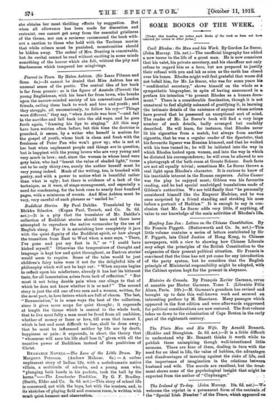Pierrot in. Town. By Helen Ashton. (Sir Isaac Pitman and
Sons. 6s.)—It cannot be denied that Miss Ashton has an unusual sense of the poetic. The central idea of her book is far from prosaic: so is the figure of Anatole (Pierrot) the young Englishman, with his heart far from town, who breaks upon the narrow-minded society of his conventional London friends, calling them back to work and love and youth ; and they struggle, all unconsciously, to follow his cry—" Things were different," they say, " when Anatole was here "—and fail in the sacrifice and fall back into the old ways, and he goes forth again, "framing his lips to singing." All this may bare been written often before, but this time the doctrine is preached, it seems, by a writer who herself is zealous for the gospel of youth, whose bbok is clean and fresh with the freshness of Peter Pan who won't grow up; who is not at her best when unpleasant people and things are in question, but is happiest with the young lovers who are very young and very much in love ; and, since the woman in whose head were grey hairs, who had "learnt the value of shaded light," turns out to be only thirty-two, surely the author herself must be very young indeed. Much of the writing, too, is touched with poetry, and with a power to notice what is beautiful rather than what is ugly; but there is evidence of a lack of the technique, as it were, of stage-management, and especially a need for condensing, for the book runs to nearly four hundred pages, with a minimum of events. And Miss Ashton must be very, very careful of such phrases as " smiled he."














































 Previous page
Previous page